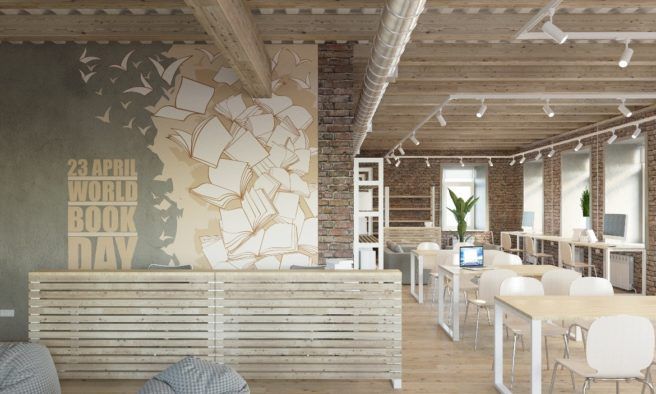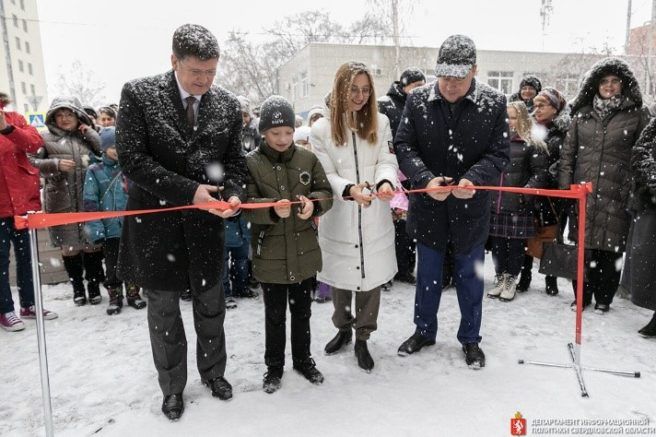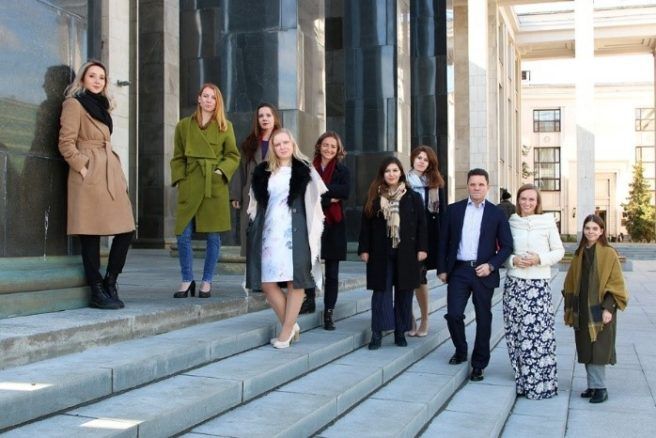In 2019, the national project “Culture” was launched in Russia. The aim of the project is to modernise 660 libraries in different regions of Russia within the next 6 years. 134 libraries in 44 regions of the Russian Federation were modernised in 2019 and at least 110 more libraries will be modernised in 2020.
The Russian State Library set up a special project office, the Department of Priority and State Projects, in order to provide methodological support for the participants, with each region getting its own project supervisor.

Tamara Ananova (left), Deputy Head of the Department of Priority and State Projects of the RSL, and Anastasia Dyatlovskaya (right), the Head of the Department of Priority and State Projects of the RSL. Photo by Maria Govtvan, RSL
The opening of model libraries across the country has led to the increased attendance and public demand for these institutions. On top of participating in events or acquiring information, young readers now come over simply because they enjoy the library environment.
The new libraries are almost unrecognizable. They get federal funding to renovate their premises, to buy new furniture and equipment, to renew their library collection and to educate the staff. From an old library, used for the sole purpose of storing books, the modern library turns into an innovative and creative space for its readers, whether it is someone, who enjoys robotics, or someone with a knack for singing.

Model Library in Stary Oskol, Belgorod Oblast
Small towns and villages require particular attention because they are the ones that experience problems with access to the Internet and to other important information resources. Opening libraries in distant regions with a harsh climate has become one of the project’s major achievements. Last year, our supervisor Anastasia Shakhanova visited the Magadan Region:
“Magadan is a territory in the Far North, which is located in the permafrost zone. When you drive down the highway, in the distance you can see abandoned settlements with multi-storey buildings, playgrounds, and other remnants of the decaying infrastructure. It is amazing that people who are almost cut off from the rest of the world and who live in harsh conditions manage to stay positive and motivated. Thanks to them, the library of the Palatka village has been successfully modernised. They overcame all the difficulties that come with the geographical position and weather conditions of their region. This territorial subject has a big problem with the delivery of all the necessities. Food and furniture can only be transported by air, which significantly drives up the costs. Sea shipment might take up a lot of time since loaded vessels often have to wait out at the port for strong winds to pass. It is in such places where there are no other alternatives for entertainment that there is an urgent need for a next-gen library.” Anastasia Shakhanova, supervisor of the Magadan Region.

The opening of the Family Reading Library, Branch No. 8 of the Berezovsky Municipal Budgetary Institution of Culture ‘Centralized Library System’, the Sverdlovsk Region, Berezovsky
There were also regions that had to face unforeseen challenges. For example, in Tulun, the Irkutsk Region, a large number of residents and many public amenities were affected by a serious flood. Despite this, the librarians of Tulun did not ask to postpone the opening of their model library. They had to change contractors and order supplies to perform repairs, as well as get furniture and equipment from other regions, but the project was still completed on time.
“The librarians of Tulun are great people and real heroes who were able to open the library as planned, no matter what. The Central City Library served as the emergency headquarters where the lists of victims were put together. Humanitarian aid was brought there, and then it was distributed and transferred to the affected residents from there, and a volunteer centre was also located at the library. The staff participated in receiving documents from the population, answered their questions, and helped them get first aid” Irina Mitrushina, supervisor of the Irkutsk Region.
Here is another story from the Volga Region.
“I spent the last week of autumn in the Urals, in Perm. It is a very cosy city ‘where bears roam streets’; it has the only mystical theatre in the world and the collection of unique wooden Orthodox sculptures, the ‘Perm gods’. In 2019, two newly modernised libraries opened in Perm: one in a remote area, and the other one in a historic building. These are different libraries with distinct spaces, but each one of them managed to save and bring out its own flair. However, what the two have in common is that all the employees are valued by those they work for, i.e., by visitors. The employees told me that almost 1000 people came to the opening ceremony, and the library premises had already been booked for months ahead, and in the other library they said, ‘We are supposed to work till 7 P.M., but since the opening we have never actually closed on time.’ These words are much more important than any numbers in the reports.” Anastasia Polyakova, supervisor of the Perm Region.
Summing up the results of the first year of the project, we can congratulate the participants on their success.
“134 and 44 are the numbers that we have repeated many times this year, doing everything possible to make them come true. By ‘we’, I mean local librarians, employees of project offices and members of the professional community, contractors and suppliers, employees of the Russian Ministry of Culture and executive regional authorities in the field of culture, as well as local population, partners, and everyone who helped to open the next generation libraries.
The synergy they created is a result in itself.
This project was an unchartered territory for all of us, and thanks to it, we all got enormous experience, the content to reflect on, and grounds for further work. Everything turned out great, and the most important number for us is the 10 million people, who live in the areas where model libraries were opened. New books, computers, furniture, the Internet connection, and the opportunity to develop and grow are now available to them!” Anastasia Dyatlovskaya, Head of the Department of Priority and State Projects

Director General of the Russian State Library Vadim Duda and staff of the RSL project office: Department of Priority and State projects. Photo by Maria Govtvan, RSL
“Dear colleagues, we concluded the first year of our project. Our task is to revive libraries for our beloved readers, which is no easy matter. I would like to point out that everyone managed to execute this large-scale project successfully and opened on time. I have no doubt that all model libraries will become popular cultural centres where local people come to receive high-quality services, get access to reliable information and, of course, read the latest books.” Vadim Duda, Director General of the Russian State Library.